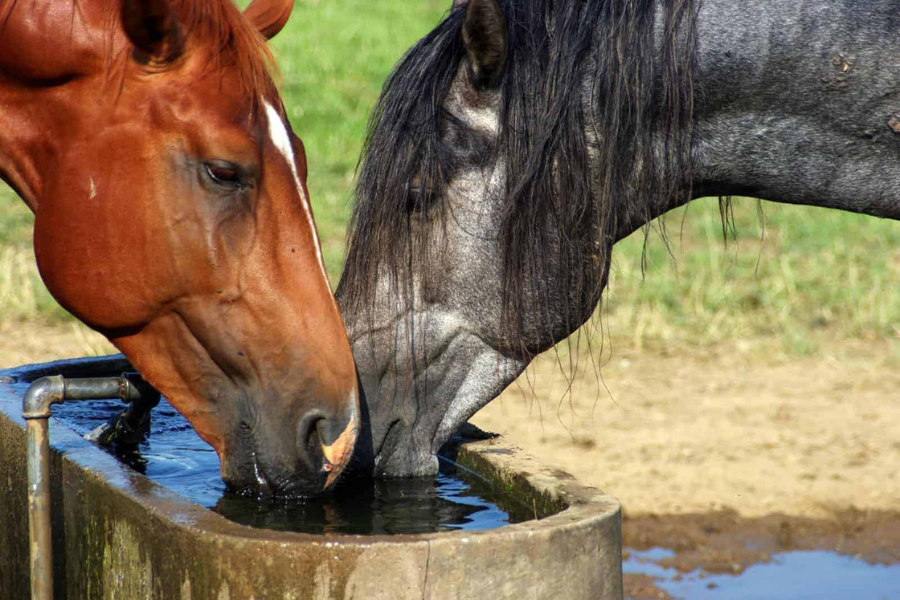Proper hydration is a cornerstone of equine health, impacting every aspect of a horse’s well-being from performance to musculoskeletal integrity. As equine osteopaths, we often encounter cases where dehydration contributes to or exacerbates physical issues. In this blog post, we’ll explore the importance of hydration for horses, its effects on the musculoskeletal system, and practical tips to ensure your horse remains adequately hydrated.
Why Hydration Matters for Horses
Water is essential for countless physiological functions in horses. An adult horse’s body is approximately 60-70% water, making hydration critical for maintaining normal bodily functions. Here’s why water is so vital:
- Thermoregulation: Horses use water to regulate their body temperature through sweating. Proper hydration helps prevent overheating, especially during exercise and hot weather.
- Digestive Health: Water aids in the digestion and absorption of nutrients, helping to prevent colic and other gastrointestinal issues.
- Cellular Function: Every cell in a horse’s body requires water to function correctly, from muscle cells to neurons.
- Joint Lubrication: Water is a key component of synovial fluid, which lubricates joints and helps prevent wear and tear on cartilage.
Hydration and the Musculoskeletal System
Proper hydration directly influences the health of a horse’s musculoskeletal system. Here’s how:
- Muscle Function: Dehydration can lead to muscle fatigue and cramping. Adequate hydration ensures that muscles receive the nutrients and oxygen they need to function optimally.
- Joint Health: As mentioned, synovial fluid, which cushions and lubricates joints, is primarily composed of water. Dehydration can reduce the volume of this fluid, leading to increased friction and joint pain.
- Tendon and Ligament Health: Hydrated tissues are more elastic and less prone to injury. Dehydrated tendons and ligaments are at higher risk of strains and tears.
- Spinal Health: Intervertebral discs, which act as cushions between the vertebrae, are composed largely of water. Proper hydration helps maintain these discs’ health, preventing back pain and stiffness.
Signs of Dehydration in Horses
Recognizing dehydration early can prevent serious health issues. Common signs include:
- Dry, Tacky Gums: Check your horse’s gums for moisture. Dry, sticky gums are a red flag.
- Prolonged Skin Tenting: Pinch a small fold of skin on your horse’s neck. If it takes longer than a couple of seconds to return to normal, your horse may be dehydrated.
- Lethargy and Weakness: Dehydrated horses often appear tired and may show less interest in normal activities.
- Decreased Appetite: A dehydrated horse may eat less, compounding potential health issues.
- Dark, Concentrated Urine: This is a sign that the body is conserving water.
Ensuring Adequate Hydration
Here are some practical tips to help keep your horse well-hydrated:
- Constant Access to Clean Water: Ensure your horse has access to fresh, clean water at all times. Check water sources regularly to ensure they are not contaminated.
- Electrolyte Supplementation: During periods of heavy sweating, such as intense exercise or hot weather, consider providing electrolyte supplements to replace lost minerals and encourage drinking.
- Wet Feed: Adding water to feed can help increase overall water intake, especially for horses that are reluctant to drink.
- Monitor Water Intake: Keep track of how much your horse is drinking, especially during changes in weather or activity levels.
- Salt Blocks: Provide access to salt blocks to encourage drinking.
The Role of Equine Osteopathy in Hydration Management
As equine osteopaths, we understand the interconnectedness of hydration and musculoskeletal health. Our approach includes:
- Hydration Assessment: Evaluating hydration status during routine check-ups to ensure it’s not impacting your horse’s musculoskeletal health.
- Holistic Care: Addressing any underlying issues that may affect hydration, such as dental problems that make drinking painful.
- Education: Providing horse owners with information on the importance of hydration and how to maintain it.
Hydration is vital for the overall health and performance of your horse, significantly influencing the musculoskeletal system. By ensuring your horse remains well-hydrated, you can help prevent a range of health issues and support optimal function and comfort. As equine osteopaths, we are committed to promoting the best practices for hydration and overall wellness in horses. Contact us today to learn more about how we can support you and your equine companion in achieving peak health.
